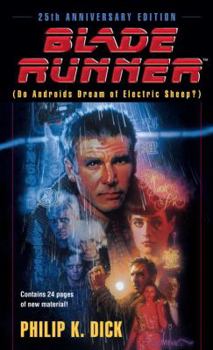Blade Runner (Movie-Tie-In Edition)
(Book #1 in the Blade Runner Series)
Select Format
Select Condition 
Book Overview
Customer Reviews
Surprisingly holds up well even though it was written in the 60s.
I liked it!
Amazing
Dick's Most Popular Novel - Marvel at the Philosophy
Total commitment
My God this book is good
Important point in book not in film.
It's life, Rick, but not as we know it...
Do Androids Dream of Electric Sheep? Mentions in Our Blog

Welcome to Sold, Viewed, Playful, New, where we spotlight popular/fascinating/favorite items in four distinct categories. Sold, for used books. Viewed, for DVDs or Blu-rays. Playful, for board, card, or video games. And New, for new books. Author Erik Davis coined the term High Weirdness in his book of the same name to refer to a genre of Sci-Fi and philosophical writing that charted "the emergence of a new psychedelic worldview out of the American counterculture of the seventies." While Davis focused primarily on authors from America’s west coast, I'm going to expand the category to include a bit more with this month's recommendations.

Our holiday plans aren't only about gatherings and gifts. We're also looking forward to what we will be reading and watching during these festive times. We enlisted OnePoll to survey 2,000 Americans about their holiday entertainment activities. Here’s what we learned.

On this day, it is acceptable to be weird and wacky. Let the goofiest part of yourself out the cellar of your mind to flap its arms and finger its lips while going blubblubblub. In other words, it's a day for odd fun. In the spirit of that, we at ThriftBooks have decided to recommend eight bizarro titles to help you get your Weird Hat on!

Did you know that in addition to books, Thriftbooks offers a large inventory of films and TV shows? And while we frequently say, "the book is always better," we have to admit that every once in a while, it isn't. Check out our list of movies that improve upon their predecessor.






